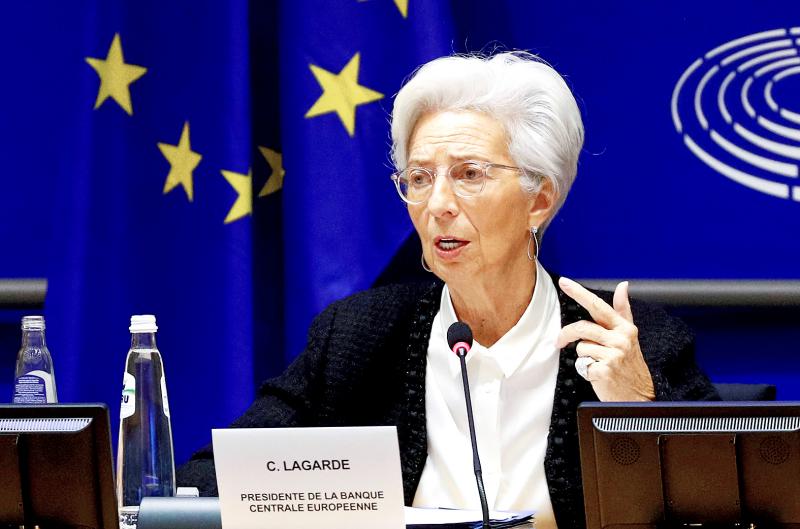The European Central Bank (ECB) “should be prepared” to possibly launch a digital currency, ECB President Christine Lagarde said yesterday, adding that the public would be asked to weigh in on the issue.
The Frankfurt, Germany-based bank is to carry out a series of experiments with a digital euro over the next six months and launch a three-month public consultation from Oct. 12.
A decision on whether to move ahead with a virtual currency project is expected in about the middle next year, it said.

Photo: Reuters
“Our role is to secure trust in money... We should be prepared to issue a digital euro, should the need arise,” Lagarde said in a statement.
This digital currency would “complement cash, not replace it,” the statement said.
The move comes as people increasingly pivot toward cashless payments, and the ECB is wary of falling behind so-called cryptocurrencies issued by private players like bitcoin and Facebook’s yet-to-be-launched Libra.
A digital currency would allow individuals as well as companies to have deposits directly with a central bank, potentially safer than with commercial banks, or cash that could be stolen.
The ECB’s deliberations echo those of the US Federal Reserve, which has been researching a digital dollar.
The People’s Bank of China in April started experimenting with digital currency in four cities.
Proponents of cryptocurrencies say they allow for faster and cheaper payments, especially across borders, as they cut out the staff, administration and the high costs needed in traditional banking and investment.
Governments in Europe have insisted that any digital currency would require careful supervision.
“A digital euro would support Europe’s drive towards continued innovation. It would also contribute to its financial sovereignty and strengthen the international role of the euro,” ECB executive board member Fabio Panetta said.
Many hurdles remain, including concerns about privacy and the impact on traditional banking and financial stability, Panetta said.
However, “a properly designed digital euro could address these risks,” he said.
The COVID-19 pandemic has accelerated the shift toward electronic payments, as people avoid notes and coins over fears that they might spread the novel coronavirus.
The ECB applied to trademark the term “digital euro” late last month, Bloomberg News reported.

Taiwan’s long-term economic competitiveness will hinge not only on national champions like Taiwan Semiconductor Manufacturing Co. (TSMC, 台積電) but also on the widespread adoption of artificial intelligence (AI) and other emerging technologies, a US-based scholar has said. At a lecture in Taipei on Tuesday, Jeffrey Ding, assistant professor of political science at the George Washington University and author of "Technology and the Rise of Great Powers," argued that historical experience shows that general-purpose technologies (GPTs) — such as electricity, computers and now AI — shape long-term economic advantages through their diffusion across the broader economy. "What really matters is not who pioneers

In a high-security Shenzhen laboratory, Chinese scientists have built what Washington has spent years trying to prevent: a prototype of a machine capable of producing the cutting-edge semiconductor chips that power artificial intelligence (AI), smartphones and weapons central to Western military dominance, Reuters has learned. Completed early this year and undergoing testing, the prototype fills nearly an entire factory floor. It was built by a team of former engineers from Dutch semiconductor giant ASML who reverse-engineered the company’s extreme ultraviolet lithography (EUV) machines, according to two people with knowledge of the project. EUV machines sit at the heart of a technological Cold

TAIWAN VALUE CHAIN: Foxtron is to fully own Luxgen following the transaction and it plans to launch a new electric model, the Foxtron Bria, in Taiwan next year Yulon Motor Co (裕隆汽車) yesterday said that its board of directors approved the disposal of its electric vehicle (EV) unit, Luxgen Motor Co (納智捷汽車), to Foxtron Vehicle Technologies Co (鴻華先進) for NT$787.6 million (US$24.98 million). Foxtron, a half-half joint venture between Yulon affiliate Hua-Chuang Automobile Information Technical Center Co (華創車電) and Hon Hai Precision Industry Co (鴻海精密), expects to wrap up the deal in the first quarter of next year. Foxtron would fully own Luxgen following the transaction, including five car distributing companies, outlets and all employees. The deal is subject to the approval of the Fair Trade Commission, Foxtron said. “Foxtron will be

INFLATION CONSIDERATION: The BOJ governor said that it would ‘keep making appropriate decisions’ and would adjust depending on the economy and prices The Bank of Japan (BOJ) yesterday raised its benchmark interest rate to the highest in 30 years and said more increases are in the pipeline if conditions allow, in a sign of growing conviction that it can attain the stable inflation target it has pursued for more than a decade. Bank of Japan Governor Kazuo Ueda’s policy board increased the rate by 0.2 percentage points to 0.75 percent, in a unanimous decision, the bank said in a statement. The central bank cited the rising likelihood of its economic outlook being realized. The rate change was expected by all 50 economists surveyed by Bloomberg. The